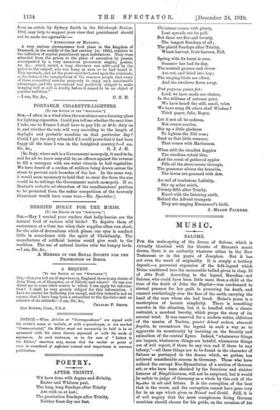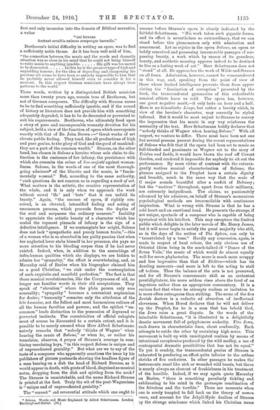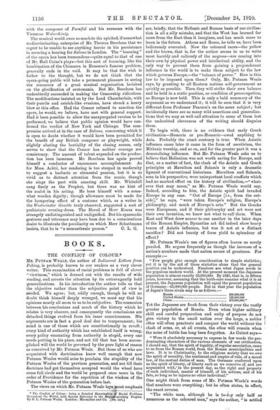MU SI C.
SALOME.
FOR the main-spring of the drama of Salome, which is virtually identical with the libretto of Strauss's music drama, there is no authority whatever either in the New Testament or in the pages of Josephus. But it has not even the merit of originality. It is simply a tertiary deposit,—a perverted expansion of the folk-legend which Heine condensed into the memorable ballad given in chap. 19 of Atta Troll. According to the legend, Herodias—not Salome, who could have been little more than a child at the time of the death of John the Baptist—was condemned to eternal penance for her guilt in procuring his death, and roamed everlastingly over the face of the earth, carrying the head of the man whom she had loved. Heine's poem is a masterpiece of laconic simplicity. There is something macabre in the situation, but it is handled with a classic restraint, a mordant brevity, which purge the story of its sensual taint. It was reserved for a modern writer, oblivious of the maxim of Tacitus, puniri debent scelera, abscondi flagitia, to reconstruct the legend in such a way as to aggravate its monstrosity by insisting on the ferocity and animalism of the central figure. Indeed, "whatsoever things are impure, whatsoever things are hateful, whatsoever things are of evil report, if there be any vice, and if there be any infamy,"—all these things are to be found in the character of Salome as portrayed in the drama which, we gather, has achieved considerable success in Germany. Those wbo have noticed the corrupt Neo-13yzantinism of a section of German art, or who have been shocked by the ferocious and sinister humour of Simplicissimas, will not be surprised, but it would be unfair to judge of Germany as a whole by this cult of the
piedies in art and letters. It is the corruption of the best that is the worst, and the corruption cannot have gone very far in an age which gives us Hdnsel tend Greta. Still, it is of evil augury that the most conspicuous living German magician should choose for his guide, on the occasion of his
first and only incursion into the domain of Biblical narrative, a writer " crti fervens Aestuat occultis animus semperque tacendis."
Beethoven's initial difficulty in writing an opera was to find a sufficiently noble theme. As it has been well said of him, "the connection between the music and the words and dramatic situation was so close in his mind that he could not bring himself to write music to anything ignoble. . . . . . His gift was too sacred
to be desecrated In this he is the greatest type of high and unyielding honour; for the idea of degrading and cheapening his precious art seems to have been so entirely impossible to him that he probably never allowed himself even to consider it for a moment. In this respect German musicians have always been patterns to the world."
These words, written by a distinguished British musician more than twenty years ago, remain true of Beethoven, but not of German composers. The difficulty with Strauss seems to be to find something sufficiently ignoble, and if the record of history or literature does not provide him with something adequately degraded, it has to be de-decorated or perverted to suit his requirements. Beethoven, who ultimately fixed upon a story of pure and unconquerable womanly devotion for his subject, held a view of the function of opera which corresponds
exactly with that of Dr. John Brown :—" Great works of art elevate public feeling. They tend, like all productions of high and pure genius, to the glory of God and the good of mankind: they are a part of the common wealth." Strauss, on the other hand, has chosen in Salome a heroine whose sole claim to dis- tinction is the eminence of her infamy, the persistence with whioh she commits the crime of lese-majesti against woman- liness. Salome, in the words of one of the most thorough. going admirers* of the libretto and the music, is "funda- mentally sensual." But, according to the same authority, "such questions do not concern us in regarding a work of art.
What matters is the artistic, the creative representation of the whole, and it is only when we approach the work without moral `ifs' and `buts' that it can unfold its beauty." Again, "the essence of opera, if rightly con- ceived, is an elevated, intensified feeling and acting of uncommon persons, which proceeds from the depths of the soul and surpasses the ordinary measure." Inability to appreciate the artistio beauty of a character which has scaled the topmost pinnacle of infamy is the sign of a defective intelligence. If we contemplate her aright, Salome does not lack " sympathetic and purely human traits,"—this of a woman who is so absorbed in her guilty passion that when
her neglected lover stabs himself in her presence, she pays no more attention to his bleeding corpse than if he had never existed. Indeed, when, in addition to the assemblage of infra-human qualities which she displays, we are bidden to admire her " sympathy," the effect is overwhelming, and, as Macaulay said of Bathe when his biographer claimed him as a good Christian, " we sink under the contemplation of such exquisite and manifold. perfection." The fact is that
these musical revolutionaries, like the Corcyraeans of old, no longer use familiar words in their old acceptations. They speak of "elevation" where the plain person only sees sensuality; " sympathy " becomes a convenient euphemism
for desire; " humanity " connotes only the attributes of the bite hwinaine, not the fullest and most harmonious culture of
all the human faculties and powers ; and the epithet " un- common" lends distinction to the possession of depraved or perverted instincts. The eccentricities of official eulogists must of course be discounted to a certain extent, and it is
possible to be merely amused when Herr Alfred Schattmann naively remarks that "nobody 'thinks of Wagner' when bearing the music of Salome," or when he, or rather his translator, observes, d propos of Strauss's courage in com- bining nnrelating keys, " in this respect Salome is unique and
of unprecedented geniality." But what are we to say of the taste of a composer who apparently sanctions the issue by his publishers of picture postcards showing the headless figure of a man bearing on a dish the head of Richard Strauss, as it would appear in death, with gouts of blood, disguised as musical notes, dropping from the dish and spirting from the neck ? The likeness is unmistakable, and the name Richard Strauss is printed at the foot. Truly the wit of the post-Wagnerians is "unique and of unprecedented geniality."
The " correct " .Lnd reverential attitude which one ought to
a Salome. Words and Music Explained by Alfred Schattmann. Londol Breitkopf and Mirk& Led.]
assume before Strauss's opera is clearly indicated by the faithful Schattmann. " His work takes such gigantic forms, and its effect is nevertheless so extraordinary, that we can stand before this phenomenon only with admiration and amazement. Let us rejoice in the opera Salome, an opera so boldly conceived and possessing innumerable passages of sur- passing beauty, a work which by reason of its grandeur, beauty, and aesthetic meaning appears indeed to be destined to live as a lasting work of art." Herr Schattmann does not " stand" at all. He approaches the work of Wilde and Strauss on all fours. Admiration, however, cannot be commandeered in this way, and, speaking from the point of view of those whose limited intelligence prevents them from appre- ciating the " fascination of corruption " presented by the book, the transcendental gymnastics of this redoubtable musical athlete leave us cold. The opera has, however, one great negative merit,—it only lasts an hour and a half. Here is no himmlische Lange, but rather a brevity which, in view of the heroine's character, may correctly be styled infernal. But it would be most unjust to Strauss to convey the impression that his music in any way reinforces the sensuality of the text. Herr Schattmann boldly declares that "nobody thinks of Wagner when hearing Salome." With all respect, we venture to differ. There must have been not one but several persons present during the recent representations of Salome who felt that if the opera had been set to music as full-blooded and passionate as Wagner set to the story of Tristan. and Isolde, it would have blown the roof off Covent Garden, and rendered it impossible for anybody to sit out the performance. By mere virtue of contrast with the extrava- gantly restless musical characterisation of Salome, the phrases assigned to the Prophet have a certain dignity and breadth, much in the same way that the scale of C major sounds beautiful after a surfeit of Debussy ; but the " motives " throughout, apart from their millinery, are extremely insignificant. The claims, so passionately advanced by his admirers, on behalf of Strauss's momentous psychological methods are irreconcilable with continuous inspiration. What is wrong with Strauss is that he has a cold heart and an emotional head. He presents the strange, if not unique, spectacle of a composer who is capable of being hysterical with his intellect. This may enrapture the limited public which delights in the later novels of Mr. Henry James, but it will never begin to satisfy the great majority who still, as in the days of the author of The Spleen, can only be " tarantulated by a tune." Hardly any concession, again, is made in respect of local colour, the only obvious use of Oriental idiom being in the much-talked-of " Dance of the Seven Veils," the music of which would do almost equally well for seven phylacteries. The score is much more scrappy and less impressive than that of Elektra—which has its dazzling moments—and more is left to the acting to stall off tedium. Thus the balance of the arts is not preserved, and for all Strauss's consummate skill as an orchestral prestidigitateur, his score seldom rises above the level of an ingenious rather than an appropriate commentary. It is a curious fact that where he attempts realism or imitation he is more often outrageous than striking. The scene of the five Jewish doctors is a reductio ad absurdum of ineffectual cleverness. When Herod declares that he will not deliver up the Prophet, for he is a man that has beheld God, the Jews raise a great dispute. In the words of the inimitable Schattmann, "it is illustrated in a delightfully drastic movement full of polyphonous audacity. Five Jews, each drawn in characteristic lines, shout confusedly. Each attempts to outdo the other by sustaining high notes. This movement is built up with unmitigated realism by means of intentional cacophonies produced by the wild medley, a use of contrapuntal dramatic possibilities that has not its equal." To put it crudely, the transcendental genius of Strauss is exhausted in producing an effect quite inferior to the artless shrieks of five cockatoos. In other passages he makes the- instruments snarl like sick or wounded wild beasts, but there is nearly always an element of freakishness in his treatment of the horrible. Indeed, if we may again quote Macaulay on Bathe, " there is something peculiarly tickling and exhilarating to his mind in the grotesque combination of the frivolous and the terrible." There are moments when one is sorely tempted to fall back on the theory of sown omen, and account for the Jekyll-Hyde dualism of Strauss oy the strange mischance which linked his Christian name with the composer of Parsifal and his surname with the Viennese Walzerkonig.
The musical world owes so much to the spirited, if somewhat undiscriminating, enterprise of Mr. Thomas Beecham that we regret to be unable to see anything heroic in his persistence in securing a hearing for Salome in London. The " booming " of the opera has been tremendous—quite equal to that of one of Mr. Hall Caine's plays—but this sort of booming, like the bombination of the Chimaera in Erasmus's famous problem, generally ends in the void. It may be that the wish is father to the thought, but we do not think that the opera-going public will take a permanent pleasure in seeing the resources of a great musical organisation lavished on the glorification of erotomania. But Mr. Beecham has undoubtedly succeeded in making the Censorship ridiculous. The modifications insisted on by the Lord Chamberlain, with their puerile and ostrich-like evasions, have struck a heavy blow at this office. Had the Censor refused to sanction the opera, he would, we believe, have met with general support. Had it been possible to allow the unexpurgated version to be performed, we believe that public opinion would have con- firmed the verdict of New York and Chicago. The com- promise arrived at in the case of Salome, concerning which it is open to doubt whether it would have been permitted for the benefit of any British composer or playwright, while slightly abating the bestiality of the closing scenes, only serves to show that the Censor has neither courage nor consistency. The amount of talent expended on the produc- tion has been immense. Mr. Beecham has again proved himself a conductor of uncommon accomplishment. As for Mme. Ackte, her rendering is too steeped in modernity to suggest a barbaric or elemental passion, but it is so vivid as to distract attention from the music, though she sings the part with amazing skill. Mr. Whitehill sang finely as the Prophet, but there was no hint of the zealot in his acting. He bore himself with a some- what wooden dignity; though allowance must be made for the hampering effect of a costume which, as a writer in the Westminster Gazette truly observed, suggested a sort of prehistoric evening-dress. The Herod of Herr Kraus was strangely undistinguished and undignified. But his spasmodic gestures and utterance may have been due to a conscientious desire to illustrate the peculiarity on which Herr Schattmann insists, that he is "a neurasthenic person." a L. G.








































 Previous page
Previous page